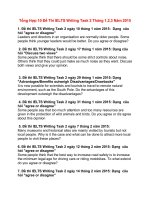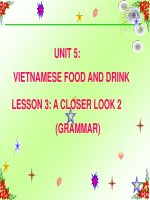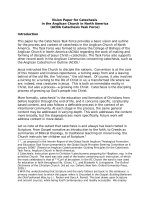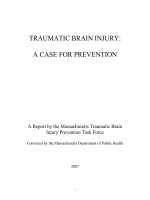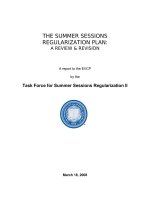Resource-Integration-Task-Force-Report-2020-05-3
Bạn đang xem bản rút gọn của tài liệu. Xem và tải ngay bản đầy đủ của tài liệu tại đây (74.43 KB, 4 trang )
Resource Integration Task Force Report
May 2020
Group Members:
●
●
●
●
●
Caitlin Balgeman, Marian University
Aaron Elam, Wabash College
Amanda Hurford, PALNI (Chair 2020)
Rebecca Johnson, formerly Manchester University (Chair 2019)
Vicki Mast, Franklin College
Executive Summary
PALNI’s Instructional Technology and Scholarly Communications advisory groups both focus on
faculty integration of resources. Together, these groups created joint action items for the
Resource Integration Task Force to address. The Task Force was charged with identifying and
developing best practices and support for the integration of content including tech tools, open
content and licensed works. Another goal was to create a resource for faculty piloting the
PALSave Open Textbook Adoption Grant Program (now Course Redesign Grants). The Task
Force created the resulting Zero-Cost Textbook Adoption LibGuide, which offers information
and best practices related to the adoption of zero-cost course materials, and can be used by
anyone involved in the process of changing from commercial to zero-cost textbooks. A Canvas
course with the same name and similar content was also created for faculty awardees of
PALSave Course Redesign Grants. The Resource Integration Task Force is now dissolved and
Amanda Hurford, chair of the Scholarly Communications Steering Committee and PALSave
Admin Team, will keep the Guide updated and appropriately in line with the faculty course. The
Resource Integration Task Forces recommends that the Instructional Tech Steering Committee
consider tech tool integration as a future action item or separate task force, as it was out of
scope for this work.
Background
PALNI’s Instructional Technology and Scholarly Communications advisory groups were both
created in 2017, representing new areas of growth for the consortium. Both of these groups
involve communication and information needs that span beyond the library and focus on faculty
integration of resources and tools. Together, Instructional Tech and ScholComm created joint
action items on the PALNI Strategic Plan for 2017-2020 addressing these areas of focus. To
address such action items, the Resource Integration Task Force was formed.
Falling under the strategic initiative to “Support and enhance library and institutional missions”
and the goal to “Investigate and support best practices in faculty and librarian collaboration to
more effectively meet local institution and library missions and serve the campus community,”
these action items were created for shared exploration and work:
● Explore best practices in OER and OA content in curriculum integration
● Determine copyright and fair use expertise and resource identification for use in an
instructional design setting
Goals
The Resource Integration Task Force was charged with identifying and developing best
practices for the integration of content within course designs and curriculum to support ease of
use and integration of resources including tech tools, open content and licensed works.
The Task Force set out to focus on three main areas of resource integration by addressing one
area per semester between Spring 2019 and Spring 2020. The areas identified for exploration
were open educational resources & creative commons licensing, library resources & licensing,
and streaming media/tech tools & copyright/fair use.
Another, more practical goal was to assist the PALSave Admin Team with creating a functional
resource for faculty use in the pilot of the Open Textbook Adoption Grants (Now called Course
Redesign Grants) slated to start in the summer of 2019. This accelerated the need for a
deliverable from the Resource Integration Task Force.
Process
Under Chair Rebecca Johnson (formerly of Manchester University and Chair of the Instructional
Tech Steering Group), the task force began in February 2019. First, an idea gathering process
was undertaken in which team members brainstormed resources for best practices, and
discussed potential content delivery formats. One source of inspiration was an open Canvas
course from Open Oregon, which was used to offer course redesign support to faculty.
Library Publishing Task Force Report | 2
The task force decided to create a LibGuide to deliver content for OER adoption in a module
based format covering:
● Setting the Stage
● OER Basics
● Locating Open Resources
● Evaluating Resources
● Course Redesign
● Integration
To facilitate that process, the modules were split up amongst the team and content was added
to a shared Google doc. Next, the LibGuide was built with content from the brainstorming
document, and revised one module at a time with feedback from the PALSave Admin Team.
When completed, each module was made available to piloting faculty to review, check for
understanding with a quiz, and fill out a form to provide feedback. The guide and content were
largely well received by faculty, but they provided some suggestions in the forms and in Zoom
meetings held by the PALSave team to incorporate for future iterations of the grant cycle.
Amanda Hurford stepped in as chair of the Task Force after Rebecca’s departure late 2019. In
Spring 2020, the Task Force compiled resources for an additional module to address the
remaining goals of the Resource Integration Task Force. This module/tab, Using Non-Open
Resources, describes best practices for non-open content including library licensed materials,
streaming media, etc., and addresses copyright implications and fair use for faculty. With the
addition of this module to the guide, its name was changed to Zero-Cost Textbook Adoption.
Responding to faculty pilot participant feedback suggesting a more linear learning format, the
PALSave Admin Team adapted the Zero-Cost Textbook Adoption LibGuide to a Canvas course
for the 2020-2021 Course Redesign Grants cohort. To reflect this change in audience, the
original LibGuide was altered to serve as a parallel, more general resource for all stakeholders
interested in the component processes to adopt a zero-cost textbook.
Work Completed
The deliverable created by the Resource Integration Task Force is the Zero-Cost Textbook
Adoption LibGuide. As described on the PALNI LibGuides list, this guide offers information and
best practices related to the adoption of zero-cost course materials, and can be used by anyone
involved in the process of changing from commercial to zero-cost textbooks. A Canvas course
with the same name was also created, with largely the same content, for faculty awardees of
PALSave Course Redesign Grants.
Addressing the action items, the guide addresses best practices for OER and OA content in
curriculum integration, and identifies copyright and fair use guidelines for instructional use.
Library Publishing Task Force Report | 3
Next Steps
With the completion of the Zero-Cost Textbook Adoption LibGuide, the Resource Integration
Task Force is now dissolved. Amanda Hurford, chair of the Scholarly Communications Steering
Committee and PALSave Admin Team, will keep the Guide updated and appropriately in line
with the faculty Canvas course content.
The Resource Integration Task Force did not have the capacity to address Tech Tool integration
at this time, and recommends that the Instructional Tech Steering Committee consider that topic
as a future action item or separate task force.
Library Publishing Task Force Report | 4
